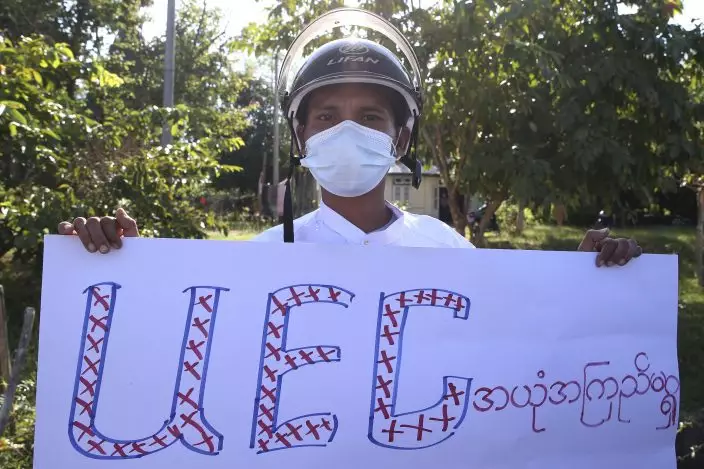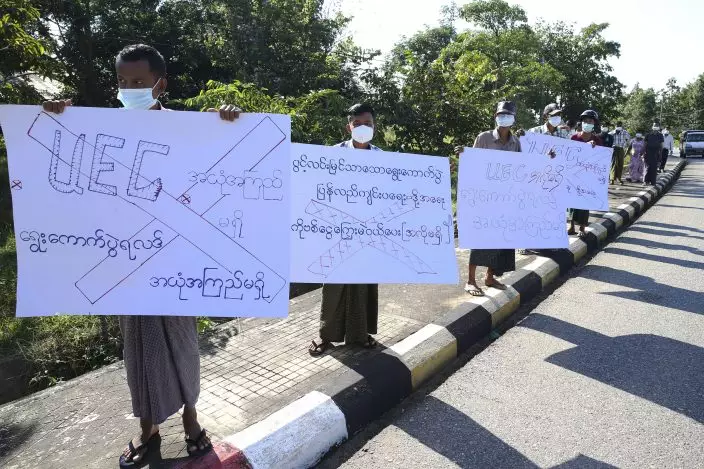Myanmar's military-backed main opposition party said Wednesday that it is rejecting the results of last weekend's general election, citing unfairness.
Unofficial results showed Tuesday that the ruling National League for Democracy party of Nobel Peace Prize laureate Aung San Suu Kyi won a majority of seats in Parliament, giving it a second five-year term in power.
At a news conference Wednesday in Yangon, Myanmar's largest city, an official from the Union Solidarity and Development Party read a statement demanding that the Union Election Commission hold another vote, and work with the military so that the election can be free, fair and unbiased.

A protester holds a placard the reads "No trust on UEC," as they protest outside Union Election Commission office, Wednesday, Nov. 11, 2020, in Naypyitaw, Myanmar. The military backed main opposition party on Wednesday said it does not recognize last Sunday's Myanmar election, citing unfairness, and rejected the results. (AP PhotoAung Shine Oo)
A member of the Union Election Commission said in a separate new conference in Naypyitaw, the capital, that the commission has “no comment on the USDP's accusations, as we don’t know what kind of facts or evidence their accusations are based on.”
Outside the UEC office, about 50 protesters from various groups held placards challenging the validity of the election before they were asked by police to leave.
The USDP statement comes one day after party chairman Than Htay said that the election process is not yet over.

Protesters hold placards reading, "No trust on UEC, No trust on election result," as they protest outside the Union Election Commission office, Wednesday, Nov. 11, 2020, in Naypyitaw, Myanmar. The military backed main opposition party on Wednesday said it does not recognize last Sunday's Myanmar election, citing unfairness, and rejected the results. (AP PhotoAung Shine Oo)
“There have been many contentious events during the whole voting process, whether in line with the law or not, and more facts are coming out,” Than Htay said in a video message posted on Facebook on Tuesday. “We will continue working according to the law to receive the final result."
Yway Mal, an independent vote counting service, said that as of Wednesday, Suu Kyi's party had won 361 seats in the combined upper and lower houses, exceeding the 322 needed for control.
The USDP has so far captured 21 seats, while 48 were won by other parties, Yway Mal said.
The official results of Sunday’s election posted online by the Union Election Commission are lagging far behind the unofficial results, but they show the advantage going to Suu Kyi’s NLD. They also confirmed that Suu Kyi won the seat she contested. The NLD claimed victory on Monday.
The Carter Center issued a statement Tuesday that “commended the efforts of the election administration, election contestants, citizen observers, media, and voters to overcome the challenges that COVID-19 presented to the conduct of Myanmar’s general elections.”
While it found voters were able to freely express their will at the polls and choose their elected representatives, the Carter Center “also noted that the quality of democracy in Myanmar continues to be undermined by serious deficiencies in the legal framework, including the reserved seats for military appointees, as well as by ongoing conflict in many areas of the country and by the exclusion of more than two million people from the electoral process because of violence or discrimination.”


